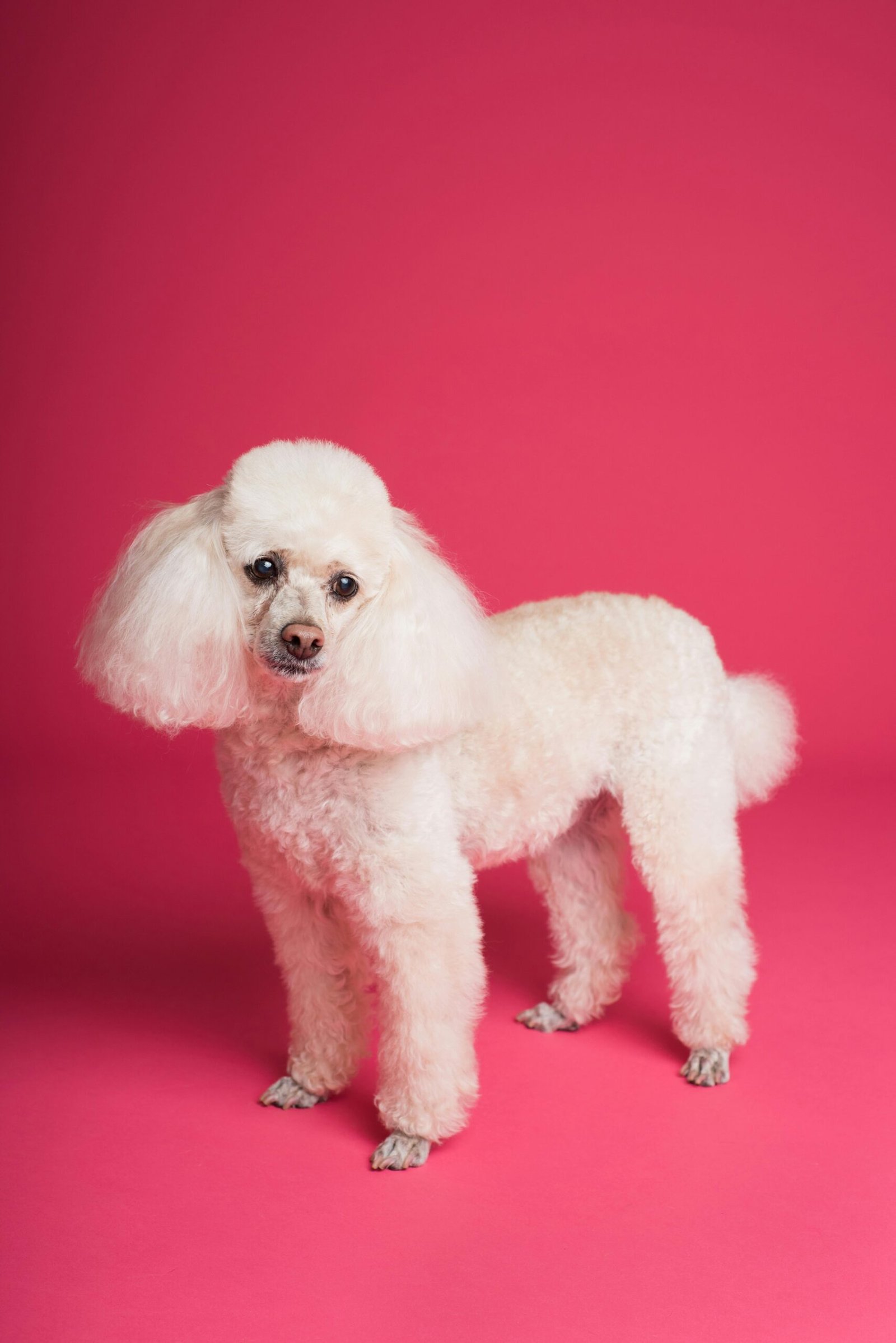Overview of the Poodle Breed
The Poodle is a highly regarded dog breed recognized for its intelligence, versatility, and distinctive appearance. This breed has its origins in Germany, where it was initially bred as a water retriever. The name “Poodle” is derived from the German word “Pudel,” which means “to splash in water,” reflecting their excellent swimming abilities. Over time, Poodles gained popularity in France, evolving into the breed we know today.
Poodles come in three distinct sizes: Standard, Miniature, and Toy. The Standard Poodle is the largest, with a height exceeding 15 inches at the shoulder, typically weighing between 40 to 70 pounds. The Miniature Poodle stands between 10 to 15 inches tall and generally weighs around 15 to 17 pounds, while the Toy Poodle is the smallest variant, measuring under 10 inches and weighing approximately 4 to 6 pounds. Each size exhibits the same characteristic curly coat, which is often seen in a variety of colors and patterns.
Poodles hold a significant place in the realm of dog shows and competitions, recognized for their striking appearance and graceful movements. They frequently excel in obedience and agility events, showcasing their eagerness to learn and perform a variety of tasks. This breed’s intelligence makes them highly trainable, which is a beneficial trait for both amateur and professional handlers alike. Their adaptability is further demonstrated by their ability to thrive in various environments, making them suitable as family pets or working dogs.
The Poodle’s sociable nature allows them to bond well with families, other pets, and strangers, rendering them an ideal choice for a wide array of households. Their affectionate demeanor, combined with their keen intellect, creates a unique companion that is cherished by many dog lovers around the globe.
Size and Physical Characteristics
Poodles are a highly regarded dog breed, known for their intelligence and elegance. They come in three distinct sizes: Standard, Miniature, and Toy. Each size has its own unique height and weight specifications, allowing potential owners to choose a Poodle that fits their lifestyle and living situation. The Standard Poodle is the largest of the three, standing between 15 to 24 inches tall at the shoulder and weighing between 40 to 70 pounds. This size offers a robust frame, making them suitable for active families who enjoy outdoor activities. In contrast, the Miniature Poodle typically measures 10 to 15 inches in height and weighs around 15 to 17 pounds, striking a balance between being compact and still robust. Finally, the Toy Poodle is the smallest variety, measuring about 10 inches or less in height and weighing between 4 to 6 pounds. This size renders them extremely portable and perfect for individuals or families who may live in smaller accommodations.
In terms of physical traits, Poodles are renowned for their distinctive appearance, which includes an elegant posture and a refined, well-proportioned body. They possess a long neck and a straight back, which contribute to their graceful silhouette. The face of a Poodle is another standout feature; they have keen, intelligent eyes and a long, tapered muzzle that exudes a sense of alertness and curiosity. Coat color and texture are noteworthy attributes as well. Poodles have a curly coat, which is not only hypoallergenic but also requires regular grooming to avoid matting. Their coats come in a variety of colors, including white, black, apricot, and grey, thus offering a spectrum of options for potential owners to choose from. The grooming needs vary based on the coat type and size, but all Poodles benefit from regular maintenance to keep their coat in optimal condition. This highlights the importance of commitment for any prospective Poodle owner.
Personality and Behavioral Traits
Poodles are renowned for their remarkable intelligence, an attribute that not only makes them quick learners but also enhances their compatibility with various living environments. Their keen intellect enables them to excel in obedience training and various canine sports, establishing them as one of the most trainable dog breeds available. This trait is complemented by their friendly demeanor, which manifests in their amiable relationships with both humans and other pets. Poodles typically display a joyful and playful spirit, factors that contribute to their popularity among families, where they are often seen as beloved companions.
Friendliness is a hallmark of the Poodle, as they tend to form strong bonds with their family members. This breed exhibits a social nature, often enjoying playtime and interaction with children, which makes them a suitable choice for households with younger members. Poodles are known for their affectionate behavior and tend to thrive on companionship, showcasing a desire to be included in family activities. Their outgoing personalities also facilitate interactions with visitors, making them welcoming hosts. When it comes to other pets, Poodles usually adapt well, particularly when socialization occurs at an early age, making them suitable additions to multi-pet households.
Despite these favorable traits, potential owners should be aware of some challenges. Poodles can be prone to separation anxiety, especially when left alone for extended periods, due to their strong attachment to their families. This anxiety can manifest in various behaviors such as excessive barking or destructive tendencies. To mitigate such issues, early training and gradual acclimatization to alone time are essential. Implementing structured routines, along with providing mental stimulation through toys or activities, can significantly alleviate separation anxiety, ensuring that a Poodle remains a content and well-adjusted member of the family.
Caring for Your Poodle
Caring for a Poodle involves meeting their specific needs in nutrition, exercise, grooming, and health management. Each Poodle size—Standard, Miniature, and Toy—has unique dietary requirements, but generally, a high-quality dog food formulated for large or small breeds is recommended. It’s essential to provide balanced nutrition that caters to their age, weight, and activity level. Feeding your Poodle twice a day, rather than allowing free feeding, can help maintain a healthy weight and avoid digestive issues.
Daily exercise is vital for Poodles, as they are energetic and intelligent dogs. A Standard Poodle typically requires at least 60 minutes of exercise, while Miniature and Toy Poodles may need around 30 to 45 minutes. Activities may include walks, playtime in the yard, or engaging in training sessions, which can provide both physical and mental stimulation. Fostering a consistent exercise routine can alleviate behavioral problems and enhance their overall well-being.
Grooming is another essential aspect of caring for your Poodle, as their distinctive curly coat requires regular maintenance. Depending on the individual’s lifestyle, Poodles should be groomed every 4 to 6 weeks. Regular brushing at home, at least two to three times a week, can help prevent matting and keep their skin healthy. Additionally, it’s vital to regularly check their ears for dirt and wax buildup and trim their nails to avoid discomfort.
Poodles can be prone to specific health concerns, including hip dysplasia, progressive retinal atrophy, and certain skin disorders. Schedule regular veterinary check-ups to monitor their health and discuss preventive measures such as vaccinations and dental care. By adhering to these care guidelines, you can help ensure your Poodle remains healthy, happy, and a cherished member of your family for many years to come.



